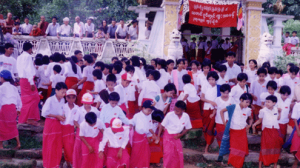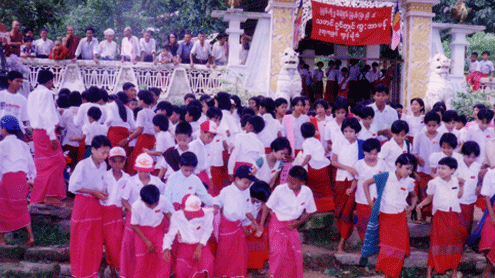
Mon National Schools administered by non-State Mon administration have been opening in Mon State and surrounding regions from early 1970s until to current. The Mon National Schools are not formally acknowledged under the Ministry of Education of the Union of Myanmar (Burma). However, the schools have been survived with the assistance of local populations in cash donation to the Mon National Education Committee.
Mon Language and Cultural Committee is formed by Buddhist monks and community language educators in early 1980s after the government banned teaching of mother language in public schools in late 1962. The Committee is comprised of monks, community leaders and youth leaders including women that undertaken voluntary role in order to preserve Mon language in Mon State and regions.
Teaching and learning mother language (mother tongue) is yet to be formally legislated under the new parliament of democratic government of Burma. National Education Reform Network, a multi-network of civil society of Burma has been preparing the draft model of the new education policy and framework in line with democratic society. On the other hand, the current Union Parliament of Burma also has proposed its own model in order to change the new legislations. However, both models are only available to a few concerned persons who have access to current administration. Inclusiveness is lacked in the current public debate but new initiative is paving the way for better teaching and learning outcomes for all children in Burma.
The case of teaching and learning mother language (mother tongue) in Burma is widely discussed among non-Burmese ethnic community in recent months after the new government opens its public involvement in local affairs. Public and community consultation have been held in major cities but rural people have little access to the public forum due to lack of awareness and resources.
The UNESCO asserts that ‘languages, with their complex implications for identity, communication, social integration, education and development, are of strategic importance for people and planet. Yet, due to globalization processes, they are increasingly under threat, or disappearing altogether. When languages fade, so does the world’s rich tapestry of cultural diversity. Opportunities, traditions, memory, unique modes of thinking and expression – valuable resources for ensuring a better future – are also lost’.
More than 50 per cent of the approximately 7,000 languages spoken in the world are likely to die out within a few generations, and 96 per cent of these languages are spoken by a mere 4 per cent of the world’s population. Only a few hundred languages have genuinely been given pride of place in education systems and the public domain, and less than a hundred are used in the digital world, according to UN information centre.
The survival of language and cultural of non-Burmese people shall be integrated with the trend of regional social and political climate.
Cultural diversity and intercultural dialogue, the promotion of education for all and the development of knowledge societies are central to UNESCO’s work. But they are not possible without broad and international commitment to promoting multilingualism and linguistic diversity, including the preservation of endangered languages, the UNESCO warned.
The International Year of Languages on 21 of February comes at a time when linguistic diversity is increasingly threatened. Language is fundamental to communication of all kinds, and it is communication that makes change and development possible in human society. Using – or not using – certain languages today can open a door, or close it, for large segments of society in many parts of the world, according to UNESCO information centre.
In the meantime, there is growing awareness that languages play a vital role in development, in ensuring cultural diversity and intercultural dialogue, but also in strengthening co-operation and attaining quality education for all, in building inclusive knowledge societies and preserving cultural heritage, and in mobilizing political will for applying the benefits of science and technology to sustainable development.
Teaching and learning Mon and other ethnic mother language shall be legally legislated in Burma if the country’s leaders are committed to restore unity, peace and prosperity of the entire population.
The survival of teaching and learning Mon and other ethnic mother language will be an enormous task that required collective effort and cooperation both morally and financially from local and international concerned persons.
Reference: http://www.un.org/en/events/motherlanguageday/background.shtml
28 February 2014 for IMNA

